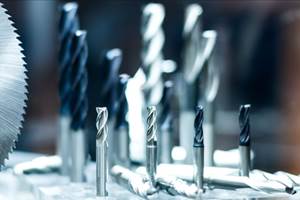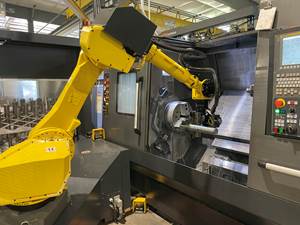Flexibility And Responsiveness Pay Off For Connecticut Job Shop
This New England job shop's key to flexible responsiveness is allowing its machinists to have total control on the shop floor. Find out how they can produce 250 to 300 orders per month--with 30% of them being new parts.
Share





Gregor Technologies LLC has built a growing business in New England by providing flexible responsiveness to customers. John Gregorich, founder and president of the Thomstan, Connecticut-based company, focuses on his customers and drives his operation to meet their needs. In turn, he has built his business as an extension of his customers' operations.
Gregor Technologies concentrates on meeting the machining needs of customers in a range of high-tech aerospace, medical instrumentation and performance automotive industries. These companies produce leading-edge products, which demand high-quality and rapid product changes. For example, Gregor Technologies usually handles 250 to 300 orders per month. While that may not be unusual for a 12-man shop, the fact that 30 percent of these orders are for new parts puts a premium on the company's ability to respond. Since founding the company in 1989, Mr. Gregorich has built his company to respond.
To become a responsive extension of his customers' manufacturing capabilities, Mr. Gregorich avoided setting up his shop in the conventional manner, which involves centralized programming distributed to CNC machines on the shop floor. Mr. Gregorich decided, rather, to invest in people who craft the part required in each job, as needed. To make his quality-driven machinists efficient, Mr. Gregorich also invested in Hurco Machine Tool Products CNC machines (Indianapolis, Indiana). Hurco's powerful, easy-to-use conversational Ultimax controls allow programming in a question-and-answer format using multiple choice and fill-in-the-blank questions. Operators work in plain English, without needing to learn codes or computer languages.
Now, rather than waiting for programs to be scheduled and edits to be made off-line, Mr. Gregorich's team of machinists has total control on the shop floor. The machinists know which machine, tooling, fixturing, and so on is available to do the job. From this information, they create programs or edits as needed to process the job in the shortest turnaround time. That is the "Flexible Responsiveness" that is key to Gregor Technologies' success.
Gregor Technologies uses three Hurco CNC machining centers equipped with Ultimax controls. Mr. Gregorich purchased the BMC20 with a 10-hp spindle drive in 1989. The newest Hurco machines are BMC30s, which have 30 inches (X) by 17 inches (Y) by 24 inches (Z) travels and 945 ipm rapids. One machine has a 10-hp spindle while the other has a 15-hp high torque spindle. Hurco's newest control technology—Ultimax with UltiPro—provides full 400 block look ahead for complex 3D surface contouring, while a Pentium processor provides full 1,000 blocks per second transfer rates with no data starvation. When coupled with full PID with feed forward velocity and acceleration control, the result is fast roughing and finish 3D contour machining with no gouges or hesitation, and superb accuracy. Ultimax with UltiPro has eight megabytes of RAM as standard that is expandable to 40 megabytes. Its integral 650-megabyte hard drive can accommodate large 3D surface programs. In addition, a 3.5-inch floppy drive and 115,200- baud RS-232 port rate are standard equipment.
Gregor Technologies worked with Brooks Associates, Inc., the New England Hurco distributor whose good relationship with Hurco made the installation, implementation process easier for Gregor Technologies. Gregor Technologies is currently running at less than one-tenth of one percent rejection rates.
Related Content
How I Made It: Amy Skrzypczak, CNC Machinist, Westminster Tool
At just 28 years old, Amy Skrzypczak is already logging her ninth year as a CNC machinist. While during high school Skrzypczak may not have guessed that she’d soon be running an electrical discharge machining (EDM) department, after attending her local community college she found a home among the “misfits” at Westminster Tool. Today, she oversees the company’s wire EDM operations and feels grateful to have avoided more well-worn career paths.
Read MoreHow I Made It: Nushrat Ahmed: CNC Swiss Operator
By day, 21-year-old Nushrat Ahmed is a CNC Swiss operator making automotive parts. By night, she handcrafts crocheted items.
Read MoreAddressing the Manufacturing Labor Shortage Needs to Start Here
Student-run businesses focused on technical training for the trades are taking root across the U.S. Can we — should we — leverage their regional successes into a nationwide platform?
Read MoreSame Headcount, Double the Sales: Successful Job Shop Automation
Doubling sales requires more than just robots. Pro Products’ staff works in tandem with robots, performing inspection and other value-added activities.
Read MoreRead Next
AMRs Are Moving Into Manufacturing: 4 Considerations for Implementation
AMRs can provide a flexible, easy-to-use automation platform so long as manufacturers choose a suitable task and prepare their facilities.
Read MoreMachine Shop MBA
Making Chips and 91ÊÓƵÍøÕ¾ÎÛ are teaming up for a new podcast series called Machine Shop MBA—designed to help manufacturers measure their success against the industry’s best. Through the lens of the Top Shops benchmarking program, the series explores the KPIs that set high-performing shops apart, from machine utilization and first-pass yield to employee engagement and revenue per employee.
Read More





















